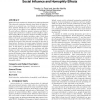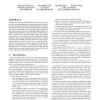650 search results - page 71 / 130 » Privacy in dynamic social networks |
WWW
2010
ACM
13 years 7 months ago
2010
ACM
Relational autocorrelation is ubiquitous in relational domains. This observed correlation between class labels of linked instances in a network (e.g., two friends are more likely ...
COMSNETS
2012
12 years 3 months ago
2012
Anonymity is one of the main virtues of the Internet, as it protects privacy and enables users to express opinions more freely. However, anonymity hinders the assessment of the ve...
ESORICS
2007
Springer
14 years 1 months ago
2007
Springer
Abstract. From a security standpoint, it is preferable to implement least privilege network security policies in which only the bare minimum of TCP/UDP ports on internal hosts are ...
CEC
2009
IEEE
14 years 2 months ago
2009
IEEE
— Using a game-theoretic model combined with the evolutionary model, we investigate the conditions under which the desirable interaction rules will evolve and sustain in various ...
INFOCOM
2012
IEEE
11 years 10 months ago
2012
IEEE
Abstract—Location privacy has been a serious concern for mobile users who use location-based services provided by the thirdparty provider via mobile networks. Recently, there hav...


